Gart der Gesundheit
The Gart der Gesundheit (German for Latin hortus sanitatis) was edited in 1485. It was written by Johann Wonnecke von Kaub and it is one of the first printed herbals in German. It was often reprinted until the 18th century. The Gart der Gesundheit is an important late medieval work concerning the knowledge of natural history, especially that of medicinal plants. In 435 chapters 382 plants, 25 drugs from the animal kingdom and 28 minerals are described and illustrated. The book was edited by Peter Schöffer in Mainz. Together with the Latin Herbarius moguntinus (Peter Schöffer 1484) and the Latin Hortus sanitatis (Jacob Meydenbach in Mainz 1491), the Gart der Gesundheit belongs to the "Group of Mainz herbal incunabula."[1]
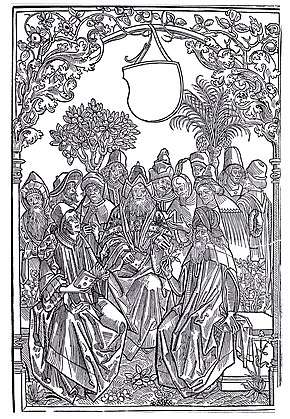
Text
The text is a collection of earlier texts in German and in Latin on drugs from the herbal, the animal and the mineral kingdoms. The reader cannot rely on the names, the author gives to his citations. Sometimes he gives no name, for example for the citations he took from the Physica of Hildegard of Bingen. More often he even gives incorrect names to his citations.[2]
Illustrations
About 100 of the 379 illustrations in the Gart der Gesundheit are of high standard quality. Erhard Reuwich is supposed to be the creator of these woodcuts, who depict the character of plants in clear lines. Opposing to some modern authors, who called these illustrations “primitive” in a bad sense, Arnold C. Klebs stated in 1925:
- „We who today in our aesthetic demands are drawing away more and more from the slavish copying of nature and demand that a work of art expresses type and character, can better appreciate the didactic value of these simple drawings than the previous generation to whom the photographic appealed as the highest form of truthful representation.“[3][4][5]
 Titlepage
Titlepage Figure examples. Left - true to nature: Egilops (Chapt. 162). Right - not true to nature: Cassia lignea (Chapt. 126)
Figure examples. Left - true to nature: Egilops (Chapt. 162). Right - not true to nature: Cassia lignea (Chapt. 126) Chapter 1. Artemiſia heyſſet byfuſz
Chapter 1. Artemiſia heyſſet byfuſz Chapter 5. Agrimonia – 0dermynge
Chapter 5. Agrimonia – 0dermynge Chapter 11. Aristologia – osterlutzye
Chapter 11. Aristologia – osterlutzye Chapter 16. Aaron – aron
Chapter 16. Aaron – aron Chapter 19. Azarum – haselwortz
Chapter 19. Azarum – haselwortz Chapter 20. Affodillus – goltwortz
Chapter 20. Affodillus – goltwortz Chapter 21. Acorus – geel lilien
Chapter 21. Acorus – geel lilien Chapter 24. Alkekengi – boberellen
Chapter 24. Alkekengi – boberellen Chapter 25. Astrens vel Meu – meister wortz
Chapter 25. Astrens vel Meu – meister wortz Chapter 28. Auricula muris sive anagallus – muß ore
Chapter 28. Auricula muris sive anagallus – muß ore Chapter 29. Avena – habern
Chapter 29. Avena – habern Chapter 53. Betonica – betonien
Chapter 53. Betonica – betonien Chapter 55. Berberis – versyg
Chapter 55. Berberis – versyg Chapter 79. Berwinca – syngrun
Chapter 79. Berwinca – syngrun Chapter 85. Celidonia – schelwortz
Chapter 85. Celidonia – schelwortz Chapter 87. Cicuta – wontzerling Cicuta virosa / Conium maculatum
Chapter 87. Cicuta – wontzerling Cicuta virosa / Conium maculatum Chapter 89. Colubrina – naterwortz
Chapter 89. Colubrina – naterwortz Chapter 98. Caput monachi – ryngel blomen
Chapter 98. Caput monachi – ryngel blomen Chapter 99. Cinoglossa – hundesczung
Chapter 99. Cinoglossa – hundesczung Chapter 101. Cardo – disteln Dipsacus fullonum / Dipsacus sylvestris
Chapter 101. Cardo – disteln Dipsacus fullonum / Dipsacus sylvestris Chapter 119. Succisa pratensis. Incorrectly assigned to chapter 119 Camphora
Chapter 119. Succisa pratensis. Incorrectly assigned to chapter 119 Camphora Chapter 122. Castaneus – kestenbaum
Chapter 122. Castaneus – kestenbaum Chapter 133. Cartamus – wilder saffran
Chapter 133. Cartamus – wilder saffran Chapter 148. Diapensia – sanickel
Chapter 148. Diapensia – sanickel Chapter 154. Enula campana – alantwortz
Chapter 154. Enula campana – alantwortz Chapter 158. Esula – Wolffsmilch
Chapter 158. Esula – Wolffsmilch Chapter 160. Eufragia – augentrost
Chapter 160. Eufragia – augentrost Chapter 162. Egilops vel egilopa – ackeley
Chapter 162. Egilops vel egilopa – ackeley Chapter 164. Edera terrestis – gundelrebe
Chapter 164. Edera terrestis – gundelrebe Chapter 166. Elleborus niger – swartz nyeszwortz
Chapter 166. Elleborus niger – swartz nyeszwortz Chapter 176. Fumus terre – ertrauch oder katzen kerbeln
Chapter 176. Fumus terre – ertrauch oder katzen kerbeln Chapter 179. Filla – benedictenwortz
Chapter 179. Filla – benedictenwortz Chapter 180. Faba – bonen
Chapter 180. Faba – bonen Chapter 190. Frage – ertbern
Chapter 190. Frage – ertbern Chapter 195. Gladiolus – slotten krut oder geel swertel
Chapter 195. Gladiolus – slotten krut oder geel swertel Chapter 203. Galla – galopffel
Chapter 203. Galla – galopffel Chapter 207. Gallitricum – scharlach
Chapter 207. Gallitricum – scharlach Taraxacum officinale. Falsch zugeordnet zum Kapitel 212 Hermodattilus – zytloisz
Taraxacum officinale. Falsch zugeordnet zum Kapitel 212 Hermodattilus – zytloisz Chapter 213. Herba paralisis – slusselblomen
Chapter 213. Herba paralisis – slusselblomen Chapter 214. Herba rubea – storckes snabel
Chapter 214. Herba rubea – storckes snabel Chapter 215. Humulus – hoppen
Chapter 215. Humulus – hoppen Chapter 217. Jusquiamus – bilsensamen Hyoscyamus niger / Hyoscyamus albus
Chapter 217. Jusquiamus – bilsensamen Hyoscyamus niger / Hyoscyamus albus Chapter 218. Juniperus – wegholler
Chapter 218. Juniperus – wegholler Chapter 223. Lactuca – lattich
Chapter 223. Lactuca – lattich Chapter 229. Lilium album – wyß lilien
Chapter 229. Lilium album – wyß lilien Chapter 234. Lavendula – lavendel
Chapter 234. Lavendula – lavendel Chapter 251. Menta – myntz
Chapter 251. Menta – myntz Chapter 253. Malva – bappeln
Chapter 253. Malva – bappeln Chapter 254. Millefolium – garbe
Chapter 254. Millefolium – garbe Chapter 256. Marrubium – andorn
Chapter 256. Marrubium – andorn Chapter 257. Mandragora – alrun Man
Chapter 257. Mandragora – alrun Man Chapter 258. Mandragora – alrun Fraw
Chapter 258. Mandragora – alrun Fraw Chapter 260. Moracelsi – mulberen Morus alba / Morus nigra
Chapter 260. Moracelsi – mulberen Morus alba / Morus nigra Chapter 263. Morabacci – brambernstruch
Chapter 263. Morabacci – brambernstruch Chapter 272. Muscus – bysum
Chapter 272. Muscus – bysum Chapter 277. Nigella – raden
Chapter 277. Nigella – raden Chapter 285. Orgianum – dosten
Chapter 285. Orgianum – dosten Chapter 292. Os de corde cervi – eyn beyn daz man fyndet in dem hertzen des hirtzen
Chapter 292. Os de corde cervi – eyn beyn daz man fyndet in dem hertzen des hirtzen Chapter 298. Pionia – benonien korner oder benedicten korner
Chapter 298. Pionia – benonien korner oder benedicten korner Chapter 299. Papaver – magsamen
Chapter 299. Papaver – magsamen Chapter 300. Polegium – poley
Chapter 300. Polegium – poley Chapter 303. Porrum – lauch
Chapter 303. Porrum – lauch Chapter 319. pisa – heyssen erbeys
Chapter 319. pisa – heyssen erbeys Chapter 333. Premula veris – maßlieben
Chapter 333. Premula veris – maßlieben Chapter 337. Rosa – rosen
Chapter 337. Rosa – rosen Chapter 341. Ribes – iohans drubelin
Chapter 341. Ribes – iohans drubelin Chapter 346. Sambucus – holler
Chapter 346. Sambucus – holler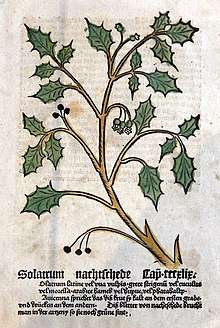 Chapter 349. Solatrum – nachtschede
Chapter 349. Solatrum – nachtschede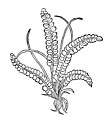 Chapter 354. Saxifraga – stein brech
Chapter 354. Saxifraga – stein brech Chapter 359. Stafisagria – byszmyntz oder luszkrut
Chapter 359. Stafisagria – byszmyntz oder luszkrut Chapter 364. Spinachia – benetz
Chapter 364. Spinachia – benetz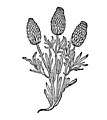 Chapter 366. Sticados arabicum – blumen von arabien
Chapter 366. Sticados arabicum – blumen von arabien Chapter 367. Sticados citrinum heyssent – rynblumen oder motten krut
Chapter 367. Sticados citrinum heyssent – rynblumen oder motten krut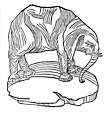 Chapter 371. Spodium – gebrant helfen beyn
Chapter 371. Spodium – gebrant helfen beyn Chapter 399. Tanacetum – reinfar
Chapter 399. Tanacetum – reinfar Chapter 410. Urtica – nesseln
Chapter 410. Urtica – nesseln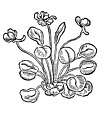 Chapter 413. Viola heyssent – violen
Chapter 413. Viola heyssent – violen Chapter 415. Valeriana vel fu – baldrian
Chapter 415. Valeriana vel fu – baldrian Chapter 417. Vermicularis – muer pfeffer oder duben kropf
Chapter 417. Vermicularis – muer pfeffer oder duben kropf Carduus marianus. Incorrectly assigned to chapter 429 Yringus – krusz distel
Carduus marianus. Incorrectly assigned to chapter 429 Yringus – krusz distel Chapter 432. Yacea – freyschem krut
Chapter 432. Yacea – freyschem krut
Editions
- Mainz (Peter Schöffer) March, 28. 1485 (Digitalisat)
- Augsburg (Hans Schönsperger?) August, 22. 1485 (Digitalisat)
- Strasbourg 1485
- Basel 1486
- Augsburg (Hans Schönsberger) June, 5. 1486 (Digitalisat)
- Augsburg (Hans Schönsberger) March, 7. 1487
- Ulm (Conrad Dinckmut) March, 31. 1487 (Digitalisat)
- Straßburg 1487 (Digitalisat)
- Straßburg 1488 (Digitalisat)
- Augsburg (Hans Schönsberger) December, 15. 1488 (Digitalisat)
- Lübeck (Arends) 1492
- Augsburg (Hans Schönsberger) August, 13. 1493 (Digitalisat)
- Augsburg (Hans Schönsberger) Mai, 10. 1496 (Digitalisat)
- Augsburg (Hans Schönsberger) Mai, 13. 1499
- Straßburg (Johann Prüß) 1507 (Digitalisat)
- Straßburg (R. Beck) 1515 (Digitalisat)[6]
Notes
- Arber, Agnes. Herbals. Their origin and evolution. A chapter in the history of botany 1470–1670. University Press, Cambridge 1912, pp. 18– 24 (Digitalisat)
- Peter Riethe. Hildegards von Bingen >Liber simplicis medicinae< im Mainzer >Gart der Gesundheit<. In: Sudhoffs Archiv. Band 89, Heft 1, 2005, S. 96–119.
- Wilhelm Ludwig Schreiber. Die Kräuterbücher des XV. und XVI. Jahrhunderts. München 1924. (Als Anhang zum Reprint des Gart der Gesundheit, Mainz 1485, S. I–LXII, hier XII–XIII)
- Arnold C. Klebs: Herbal facts and thoughts. Introduction of the Catalogue of Early Harbals from the Library of Dr. Karl Becher, Karlsbad, p. IX, l’art ancien S. A., Lugano 1925.
- Julius Schuster: Secreta Salernitana und Gart der Gesundheit. In: Mittelalterliche Handschriften. Festgabe zum 60. Geburtstag von Hermann Degering. Leipzig 1926, S. 203–237, hier: S. 220.
- Arnold C. Klebs. Incunabula scientifica et medica. The Saint Catherine Press Ltd., 1938, p. 171f. (Digitalisat)
External links
![]()